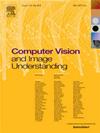DSU-GAN:基于生成式对抗网络的稳健正面人脸识别方法
IF 4.3
3区 计算机科学
Q2 COMPUTER SCIENCE, ARTIFICIAL INTELLIGENCE
引用次数: 0
摘要
人脸识别技术被广泛应用于不同的领域,如门禁、支付、医疗、教育等。然而,人们很少关注非正面人脸识别,尤其是模型训练和生成图像的质量。为此,本文提出了一种基于生成式对抗网络(DSU-GAN)的新型鲁棒正面人脸识别方法。为了增强生成器在学习姿态变化的人脸图像时的鲁棒性,在生成器-编码器中提出了可变形卷积。在可变形卷积中提出了一致性损失机制,以避免额外的计算开销和过拟合问题。此外,在生成器-编码器中还提出了一种自我关注机制,以避免信息过载,该机制能够在像素级构建特征图中任意两个位置的长期依赖关系。为了平衡生成器和鉴别器之间的能力,提出了一种基于 U-Net 的新型鉴别器架构。最后,通过一个新的上采样模块改进了单向判别器。实验结果表明,我们的建议在处理多用途人脸时,在 Multi-PIE 人脸数据集上实现了 95.14% 的平均 Rank-1 识别率。此外,在最近进行的 IJB-A 和 IJB-C 基准测试中,我们的方案也取得了优异的成绩。本文章由计算机程序翻译,如有差异,请以英文原文为准。
DSU-GAN: A robust frontal face recognition approach based on generative adversarial network
Face recognition technology is widely used in different areas, such as entrance guard, payment etc. However, little attention has been given to non-positive faces recognition, especially model training and the quality of the generated images. To this end, a novel robust frontal face recognition approach based on generative adversarial network (DSU-GAN) is proposed in this paper. A mechanism of consistency loss is presented in deformable convolution proposed in the generator-encoder to avoid additional computational overhead and the problem of overfitting. In addition, a self-attention mechanism is presented in generator–encoder to avoid information overloading and construct the long-term dependencies at the pixel level. To balance the capability between the generator and discriminator, a novelf discriminator architecture based U-Net is proposed. Finally, the single-way discriminator is improved through a new up-sampling module. Experiment results demonstrate that our proposal achieves an average Rank-1 recognition rate of 95.14% on the Multi-PIE face dataset in dealing with the multi-pose. In addition, it is proven that our proposal has achieved outstanding performance in recent benchmarks conducted on both IJB-A and IJB-C.
求助全文
通过发布文献求助,成功后即可免费获取论文全文。
去求助
来源期刊

Computer Vision and Image Understanding
工程技术-工程:电子与电气
CiteScore
7.80
自引率
4.40%
发文量
112
审稿时长
79 days
期刊介绍:
The central focus of this journal is the computer analysis of pictorial information. Computer Vision and Image Understanding publishes papers covering all aspects of image analysis from the low-level, iconic processes of early vision to the high-level, symbolic processes of recognition and interpretation. A wide range of topics in the image understanding area is covered, including papers offering insights that differ from predominant views.
Research Areas Include:
• Theory
• Early vision
• Data structures and representations
• Shape
• Range
• Motion
• Matching and recognition
• Architecture and languages
• Vision systems
 求助内容:
求助内容: 应助结果提醒方式:
应助结果提醒方式:


